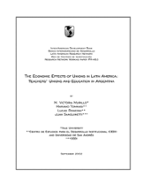The Economic Effects of Unions in Latin America: Teachers' Unions and Education in Argentina
Date
Sep 2002
This paper considers the effects of trade unions on the education sector in Argentina and the channels of union influence on the performance of this crucial sector. The authors find that those provinces where teacher unionism is fragmented, where union density is higher and where political relations with the governor are more conflictual, have more strikes (fewer class days). Based on estimates of education production functions both in this paper and elsewhere, we expect this to translate into lower student performance. The authors then find a number of weak conclusions related to the impact that unions have on several variables that affect students' performance (i.e., teachers' tenure, job satisfaction, class size, education budget and teachers' salaries). Reviewing these results, we conclude that the impact of unions on students' performance depends on the channel and kind of political market where unions operate, but not on the existence of unions per se.



